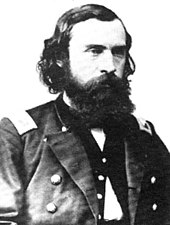William d'Alton Mann
William d'Alton Mann (born September 27, 1839 in Sandusky , Ohio ; died May 17, 1920 in Morristown , New Jersey ) was an American businessman and newspaper publisher and officer in the United States Army in the Civil War .
Life
Mann grew up as the son of William R. Mann and Eliza Ford Mann in a large family in his hometown and in Adrian (Michigan) . Trained as an engineer, he joined the 1st Michigan Volunteer Cavalry Regiment as a captain at the beginning of the Civil War in 1861 . In 1863 he commanded the 7th Michigan Volunteer Cavalry Regiment at the Battle of Gettysburg , meanwhile promoted to Colonel . A year later he said goodbye, but continued to be addressed as Colonel Mann .
During his time in the army, Mann had received various patents for equipment that he had developed for the US Army. With the money he gained , he got into the oil business . However, he could not keep the profit promises he had made when selling shares and was sued by business partners. He changed location and business area, in Mobile (Alabama) he bought several newspapers. A congressional candidacy in the first congressional constituency of Alabama for the Democrats was unsuccessful in 1869.
In 1871, Mann received a patent for a sleeping car he had developed , which he called a boudoir car . Attempts to introduce the vehicle in competition with the already established sleeping cars by George Mortimer Pullman at American railroad companies were unsuccessful. So Mann went to Europe with his ideas and first founded a factory near London to build sleeping cars. In 1873, together with Georges Nagelmackers, he founded Mann's Railway Sleeping Car Company , which started operating its first sleeping car courses in Europe from June 1873. At the end of 1874 the company already owned 42 sleeping cars, known as the Mann Boudoir Sleeping Car for patent reasons . Mann remained president of the company until 1875, when he sold his shares to Nagelmackers, who in 1876 founded the Compagnie Internationale des Wagons-Lits as the successor company , which took over 53 sleeping cars on 22 courses from its predecessor company.
Back in the United States, Mann was a co-owner of the gossip magazine Town Topics from 1891 , which his brother Eugene had acquired in 1885. He drove the magazine's circulation from 60,000 to 140,000 by focusing the magazine on high society scandal stories . In the following years, Mann founded further offshoots of the successful paper. In 1900 he launched The Smart Set , a more sophisticated literary magazine . Mann also tried to blackmail the celebrities portrayed in it by publishing a yearbook Fads and Fancies of Representative Americans at the Beginning of the Twentieth Century and, as in Town Topics , was paid for the concealment of rumors or scandals. In a dispute with Norman Hapgood , the publisher of the rival paper Collier’s , Mann ultimately failed and was convicted of perjury . In 1911 he had to sell Smart Set . The founding of other magazines was not very successful.
Mann died in 1920 of complications from pneumonia . He was buried in Woodlawn Cemetery in Bronx , New York City .
Web links
- CV on encyclopedia.com (English)
- etiquipedia.blogspot.com: Colonel William d'Alton Mann: The Rudest Man of the 20th Century?
Individual evidence
- ^ Hans D. Reichardt, Joachim Deppmeyer: The blue sleeping & dining cars: A history of the international sleeping car society. Alba Verlag, Düsseldorf 1976, p. 11
- ^ Albert Mühl, Jürgen Klein: Traveling in luxury trains. EK-Verlag, Freiburg im Breisgau 2006, p. 20
- ↑ de.findagrave.com: Colonel William D'Alton Mann , accessed April 15, 2020
| personal data | |
|---|---|
| SURNAME | Man, William d'Alton |
| BRIEF DESCRIPTION | American businessman and newspaper publisher |
| DATE OF BIRTH | September 27, 1839 |
| PLACE OF BIRTH | Sandusky , Ohio |
| DATE OF DEATH | May 17, 1920 |
| Place of death | Morristown , New Jersey |

